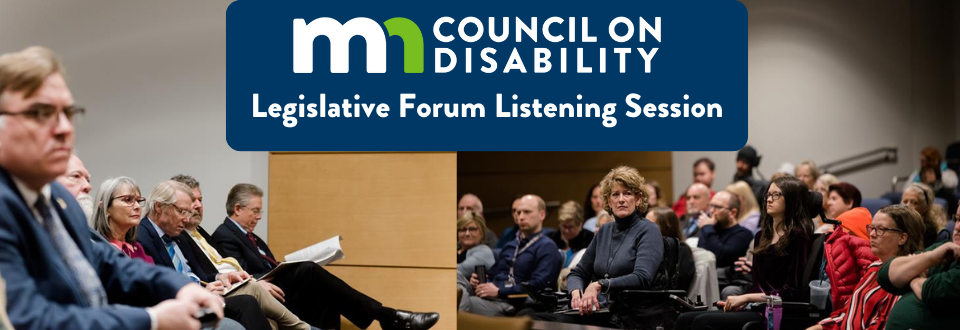 On March 30th, the Minnesota Council on Disability (MCD) held our Legislative Forum Listening Session, an important follow-up to our December Legislative Forum. The Listening Session was an opportunity to hear public remarks from the community on pressing issues impacting Minnesotans with disabilities. Folks shared powerful stories of their experiences and the experiences of their loved ones that will be helpful in informing our work going forward.
On March 30th, the Minnesota Council on Disability (MCD) held our Legislative Forum Listening Session, an important follow-up to our December Legislative Forum. The Listening Session was an opportunity to hear public remarks from the community on pressing issues impacting Minnesotans with disabilities. Folks shared powerful stories of their experiences and the experiences of their loved ones that will be helpful in informing our work going forward.
The Listening Session began with welcoming remarks from MCD Chair Nikki Villavicencio highlighting major points of interest this year, including our 50th anniversary. Public Policy Director Trevor Turner then shared an update on this year’s remarkably busy legislative session, including:
- an explanation of the three bill deadlines that happen from March through early April
- what legislation the Governor has already signed
- the process for omnibus bills
Many disability-related bills will likely be included in omnibus bills this session.
Following the opening remarks and legislative update, the rest of the session was devoted to public remarks from members of the community.
Remarks began with comments from Rebecca St. Martin about the state’s PCA shortage, highlighting the difficulty in finding people to fill these critical roles and the major budget gaps people with disabilities encounter in affording care. She emphasized the importance of allocating suitable funding for people with disabilities and “refortify individual choice home care budgets.”
Next, Mary Hauff shared an update on the Inclusive Higher Education Act, which has progressed with minor differences to both the Senate and House higher education omnibus bills. She also mentioned Senate File 2397, which provides grant funding for organizations that do work around supported decision making. Finally, Mary noted that the 2024 legislative session, being a policy year, presents an important opportunity to address higher education accessibility for all students with disabilities.
Scott Berglund shared his perspective as an educator at the Minnesota State Academy for the Blind, particularly noting challenges with securing accessible and supportive career pathways for Minnesotans with disabilities. He noted that “many young people with disabilities actually end up staying at home with their parents, due to the lack of options and support that is available.”
Megan Chabot shared further thoughts on this subject, telling the group about her son Adam. She described the struggles of finding further education and work programs that are inclusive for her son and others. Megan emphasized that finding solutions to this problem is vital “to help Adam and all profoundly disabled Minnesotans reach their maximum potential and lead full lives.”
Amanda Schermerhorn told the group about her son Richard, who has level 3 autism. Richard is often subjected to restrictive procedures that leave him excluded and that are “detrimental to his socialization.” She noted that there are several bills that can help with this problem, including Senate File 0183 and House File 0271, which provide for non-exclusionary discipline.
Kathy Cooper drew the group’s attention to the frequent abuse people with disabilities face in court-appointed guardianships and conservatorships. She shared personal stories of separation and loss that she experienced through this system and emphasized that it puts many people with disabilities in danger of being exploited and cut off from their families. Kathy also wanted to share resources with the community to learn more about this issue, including a documentary called “Deception of Protection: Anatomy of an Involuntary Guardianship” (Video) and a course on court access and common law offered through the National Liberty Alliance.
Joyce Lacey joined Kathy in voicing concerns about guardianships and conservatorships, noting that in the abuse that arises in these systems, people with disabilities have their rights violated and are often exploited for financial gain. She urged MCD and the state legislature to act on this issue in next year’s session with meaningful legislation.
The Minnesota Council on Disability works best with input from the public, and major positive change begins with people sharing their perspectives and their stories. We are grateful to everyone who attended the Listening Session and everyone who shared their experiences. We look forward to continuing to work with the community to address these and other important issues for Minnesotans with disabilities.
If you are wondering about disability-related legislation introduced this session, you can check out MCD’s disability-related bill tracker.
We would like to know what you think of our bill tracking efforts. Please take the time to fill out this bill tracking survey.